
Gheorghe Zamfir is a Romanian nai musician.
Traditional pop is Western popular music that generally pre-dates the advent of rock and roll in the mid-1950s. The most popular and enduring songs from this era of music are known as pop standards or American standards. The works of these songwriters and composers are usually considered part of the canon known as the "Great American Songbook". More generally, the term "standard" can be applied to any popular song that has become very widely known within mainstream culture.
The 11th Annual Grammy Awards were held on March 12, 1969. They recognized accomplishments of musicians for the year 1968.
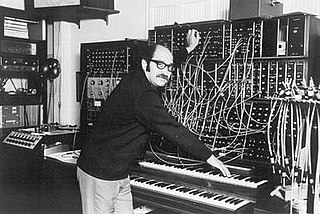
Morton Sanford Garson was a Canadian-born composer, arranger, songwriter, and pioneer of electronic music. He is best known for his albums in the 1960s and 1970s that were among the first to feature Moog synthesizers. He also co-wrote several hit songs, including "Our Day Will Come", a hit for Ruby & the Romantics. According to Allmusic, "Mort Garson boasts one of the most unique and outright bizarre resumés in popular music, spanning from easy listening to occult-influenced space-age electronic pop."
"It Was a Very Good Year" is a song composed by Ervin Drake in 1961 and originally recorded by Bob Shane with the Kingston Trio.
John Valmore Pearson was a British composer, orchestra leader and pianist. He led the Top of the Pops orchestra for sixteen years, wrote a catalogue of library music, and had many of his pieces used as the theme music to television series.
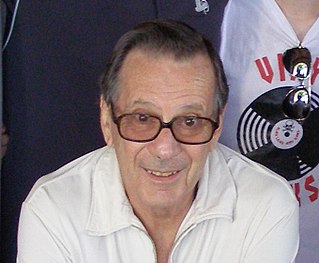
Stuart Phillips is an American composer of film scores and television-series theme music, conductor and record producer. He is perhaps best known for composing the theme tune to the television series Battlestar Galactica and Knight Rider.

101 Strings Orchestra was a brand for a highly successful easy listening symphonic music organization, with a discography exceeding 150 albums and a creative lifetime of around 30 years beginning in 1957. 101 Strings had a trademark sound, focusing on melody with a laid-back ambiance most often featuring strings. Their LPs were individualized by the slogan "The Sound of Magnificence", a puffy cloud logo and sepia-toned photo of the orchestra. The 101 Strings orchestra included 124 string instruments, and was conducted by Wilhelm Stephan. The orchestra's famous official photograph was taken in the Musikhalle Hamburg.
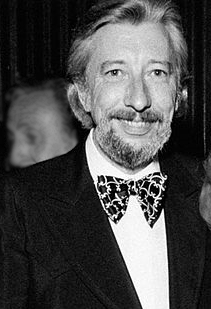
Raymond Lefèvre was a French easy listening orchestra leader, arranger and composer.
The Living Strings were a studio orchestra founded in 1959 by RCA Victor for a series of easy listening recordings issued on the RCA Camden budget label. There were also related groups called the Living Voices, Living Brass, Living Guitars, Living Marimbas, Living Jazz, Living Trio, Living Percussion, and Living Organ.
Ethel Nagy Gabriel was an American record producer and record executive with a four-decade career at RCA Victor. She produced over 2,500 music albums including 15 RIAA Certified Gold Records and hits by Elvis Presley, Perry Como, Al Hirt, Henry Mancini, and Roger Whittaker among others.
"(You'd Be So) Easy to Love" is a popular song written by Cole Porter for William Gaxton to sing in the 1934 Broadway show Anything Goes. However Gaxton was unhappy about its wide vocal range and it was cut from the musical. Porter re-wrote it for the 1936 film Born to Dance, where it was introduced by Eleanor Powell, James Stewart, and Frances Langford under its alternate title, "Easy to Love". The song was only later added to the 1987 and 2011 revivals of Anything Goes under the complete title "You’d Be So Easy to Love".
André Charles Jean Popp was a French composer, arranger and screenwriter.
The Hollyridge Strings were an American studio orchestra that specialized in easy-listening music, and recorded for the Capitol Records label in the 1960s and 1970s. Stu Phillips, Mort Garson, and Perry Botkin, Jr. were among those who produced, arranged, and conducted the group's recordings.
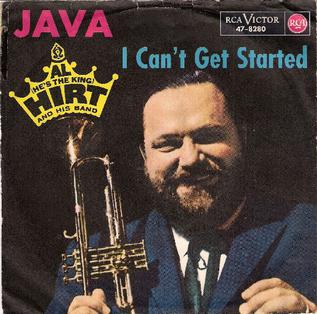
"Java" is an instrumental adaptation from a 1958 LP of piano compositions, The Wild Sounds of New Orleans, by Tousan, also known as New Orleans producer/songwriter Allen Toussaint. As was the case of the rest of Toussaint's LP, "Java" was composed at the studio, primarily by Toussaint.

Days of Wine and Roses and Other TV Requests is the eleventh studio album by American pop singer Andy Williams and was released in April 1963 by Columbia Records following his first season as host of his variety series, The Andy Williams Show. The LP has a studio recording of the closing theme from the show, "May Each Day", and continues the format of his previous Columbia releases by including songs from the 1920s, 1930s, 1940s, and 1950s.

The Great Songs from "My Fair Lady" and Other Broadway Hits is the fifteenth studio album by American pop singer Andy Williams and was released in September 1964 by Columbia Records, one month before the premiere of the film version of My Fair Lady starring Audrey Hepburn.
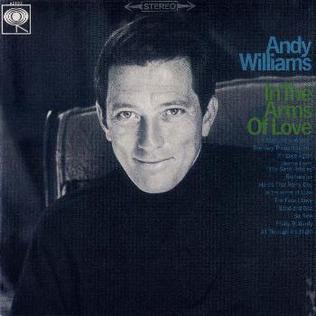
In the Arms of Love is the nineteenth studio album by American pop singer Andy Williams and was released on December 19, 1966, by Columbia Records and was the last of twelve consecutive Williams studio LPs produced by Robert Mersey.

The Way We Were is the thirty-second studio album by American pop singer Andy Williams, released in the spring of 1974 by Columbia Records and was a return to singing songs that his audience was already familiar with after Solitaire, his previous LP that was less reliant on covers of recent pop hits, did not perform well.
Orchestral pop is pop music that has been arranged and performed by a symphonic orchestra.









